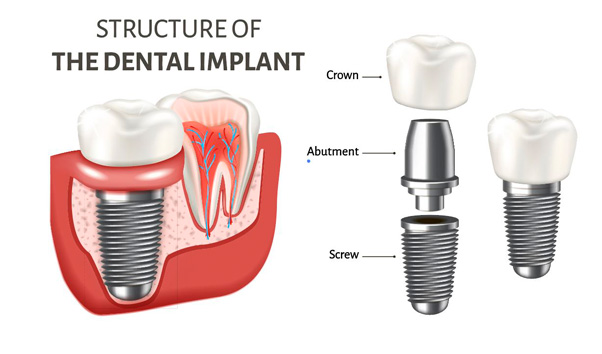For a lifetime of smiles!

Are dental implants the right choice for you?
Despite improvements in dental care, millions of Americans suffer tooth loss -- mostly due to tooth decay, periodontal disease, or injury. For many years, the only treatment options available for people with missing teeth were bridges and dentures. But, today, dental implants are available.
What Are Dental Implants?
Dental implants are replacement tooth roots. Implants provide a strong foundation for fixed (permanent) or removable replacement teeth that are made to match your natural teeth.
There are many advantages to dental implants, including:
 Improved appearance. Dental implants look and feel like your own teeth. And because they are designed to fuse with bone, they become permanent.
Improved appearance. Dental implants look and feel like your own teeth. And because they are designed to fuse with bone, they become permanent.
 Improved speech. With poor-fitting dentures, the teeth can slip within the mouth causing you to mumble or slur your words. Dental implants allow you to speak without the worry that teeth might slip.
Improved speech. With poor-fitting dentures, the teeth can slip within the mouth causing you to mumble or slur your words. Dental implants allow you to speak without the worry that teeth might slip.
 Improved comfort. Because they become part of you, implants eliminate the discomfort of removable dentures.
Improved comfort. Because they become part of you, implants eliminate the discomfort of removable dentures.
 Easier eating. Sliding dentures can make chewing difficult. Dental implants function like your own teeth, allowing you to eat your favorite foods with confidence and without pain.
Easier eating. Sliding dentures can make chewing difficult. Dental implants function like your own teeth, allowing you to eat your favorite foods with confidence and without pain.
 Improved self-esteem. Dental implants can give you back your smile and help you feel better about yourself.
Improved self-esteem. Dental implants can give you back your smile and help you feel better about yourself.
 Improved oral health. Dental implants don't require reducing other teeth, as a tooth-supported bridge does. Because nearby teeth are not altered to support the implant, more of your own teeth are left intact, improving long-term oral health.
Improved oral health. Dental implants don't require reducing other teeth, as a tooth-supported bridge does. Because nearby teeth are not altered to support the implant, more of your own teeth are left intact, improving long-term oral health.
 Durability. Implants are very durable and will last many years. With good care, many implants last a lifetime.
Durability. Implants are very durable and will last many years. With good care, many implants last a lifetime.
 Convenience. Removable dentures are just that; removable. Dental implants eliminate the embarrassing inconvenience of removing dentures, as well as the need for messy adhesives to keep them in place.
Convenience. Removable dentures are just that; removable. Dental implants eliminate the embarrassing inconvenience of removing dentures, as well as the need for messy adhesives to keep them in place.

An implant acts as a substitute for the root of your missing tooth. The titanium fixtures bond to the bone in your mouth. These fixtures form a foundation for a replacement tooth that looks and feels just like your natural teeth. Implants have quickly become the most preferred method of tooth replacement.
There are numerous advantages of dental implant treatment over traditional treatment options. For instance, it is not necessary to grind down the bordering or adjacent teeth for a bridge, or secure a partial denture to them with clasps that might eventually loosen the natural teeth. By utilizing titanium fixtures, people who are missing teeth may be spared the many problems associated with traditional false teeth.
Immediate implants are dental implants that are placed immediately after a tooth extraction. Sometimes a functioning temporary replacement tooth is immediately placed on the implant, instead of waiting months to have a replacement tooth installed.
How will a dental implant benefit my oral health?
Improved facial and bone features. Dental implants preserve natural tooth tissue by avoiding the need to cut down adjacent teeth for conventional bridgework. They also will preserve bone and significantly reduce bone resorption and deterioration that results in loss of jawbone height.
What happens if a missing tooth is not replaced?
Your teeth support each other, so when one is missing, the teeth on either side can start to shift into the gap. This allows plaque to form, increasing your risk of dental diseases such as tooth decay and gum disease that could lead to further tooth loss.
How long do implants last?
Unlike natural teeth, dental implants are not susceptible to dental disease such as decay; however, the health of the gums is vital to maintaining lasting implant success. Conscientious home care by the patient and regular professional cleanings and check-ups are essential elements for dental implant sustainability. Each patient is different, and success relies upon diagnosis and planning, medical history, and a variety of other factors.
How long is an implant procedure?
Placing a single implant may take as little as thirty minutes, while a complex surgery requiring multiple replacements can take more than 3–4 hours. After the implant is placed, the patient schedules a follow-up appointment several months later to allow the implant to properly heal and fuse with the jawbone.
Does implant treatment hurt?
Most dental implant patients say the procedure doesn't hurt and the discomfort is minimal. Plus, implants are popular because they give patients a natural, lasting smile, allowing them to live and eat without holding back.
